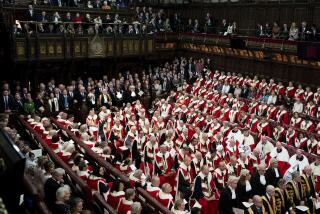Britain votes on election method in a battle that has politicians boiling
- Share via
Reporting from London — In a rare and bitterly fought referendum, Britons went to the polls Thursday to decide whether to scrap the way they’ve traditionally elected members of Parliament in favor of a more complex system allowing voters to rank their choices.
Most surveys suggest that the proposal will go down in defeat, which would deal a major blow to those who contend that the current winner-take-all system falls short of reflecting the will of the people. Results are expected Friday.
Debate over the measure has been particularly acrimonious, exposing cracks in Britain’s coalition government and proving that nothing brings out politicians’ claws so much as when their own jobs are at stake. Adding to the sense of moment, this is Britain’s first referendum in 36 years. In 1975, voters were asked whether they wanted to remain part of the European Economic Community, the precursor to today’s European Union. (Answer: yes.)
The question on Thursday’s ballot was whether to ditch the present electoral system, known as “first past the post,” and adopt a preferential voting method to elect members for what’s proudly known here as the “mother of all parliaments.”
Currently, whichever candidate receives the most votes in a district wins, regardless of whether it’s a majority. In a close four-way contest, for example, a candidate can get elected to the House of Commons with 26% of the votes cast.
Backers of the present system say it’s as simple and straightforward as a footrace and has served the country well for decades. Because modern British politics has mostly been a two-party affair, it leads to governments with strong majorities able to enact a clear-cut agenda.
But critics charge that the results often allow a party to dominate government without having earned at least 50% of the national vote.
The referendum offered a replacement system called the “alternative vote,” which would allow Britons to rank their choices and would redistribute the votes of losing candidates until one person emerged with a majority.
Arguments over the proposal have opened damaging rifts between the two parties that form Britain’s ruling coalition: the Conservatives, or Tories, who generally want to keep the status quo, and the Liberal Democrats, or Lib Dems, who press for change. (The opposition Labor Party is split on the issue.)
Holding the referendum was a condition of the Lib Dems, who have long trailed the Tories and Laborites at the polls, to join the government. But the ruling parties agreed that they could campaign on opposing sides, which has produced surreal scenes over the last few weeks of ministers from the two parties denouncing each other in public over the referendum and then defending government policies together in Parliament.
The campaign has fed rumors of a new frostiness between Prime Minister David Cameron of the Tories and Deputy Prime Minister Nick Clegg of the Lib Dems, two men whose ease with each other and close working relationship have often been jollily described as a civil union.
In Thursday’s edition of the Daily Mail, Cameron urged Britons to vote no. He said the proposed system was “so confusing, unfair and obscure that it is only used by Australia, Fiji and Papua New Guinea,” but left it unclear whether he thought residents of those countries were therefore extremely smart or hopelessly misguided.
Polls show that his view will almost certainly prevail. Although the yes campaign started strongly, repeated attacks from the other side seriously eroded its support.
Analysts say a defeat for the referendum would further damage Clegg’s credibility. Since joining forces with the Conservatives, his party has fallen to almost historic lows in public opinion.
The Liberal Democrats are also bracing for heavy losses in local elections that were held Thursday in conjunction with the referendum.
More to Read
Sign up for Essential California
The most important California stories and recommendations in your inbox every morning.
You may occasionally receive promotional content from the Los Angeles Times.











